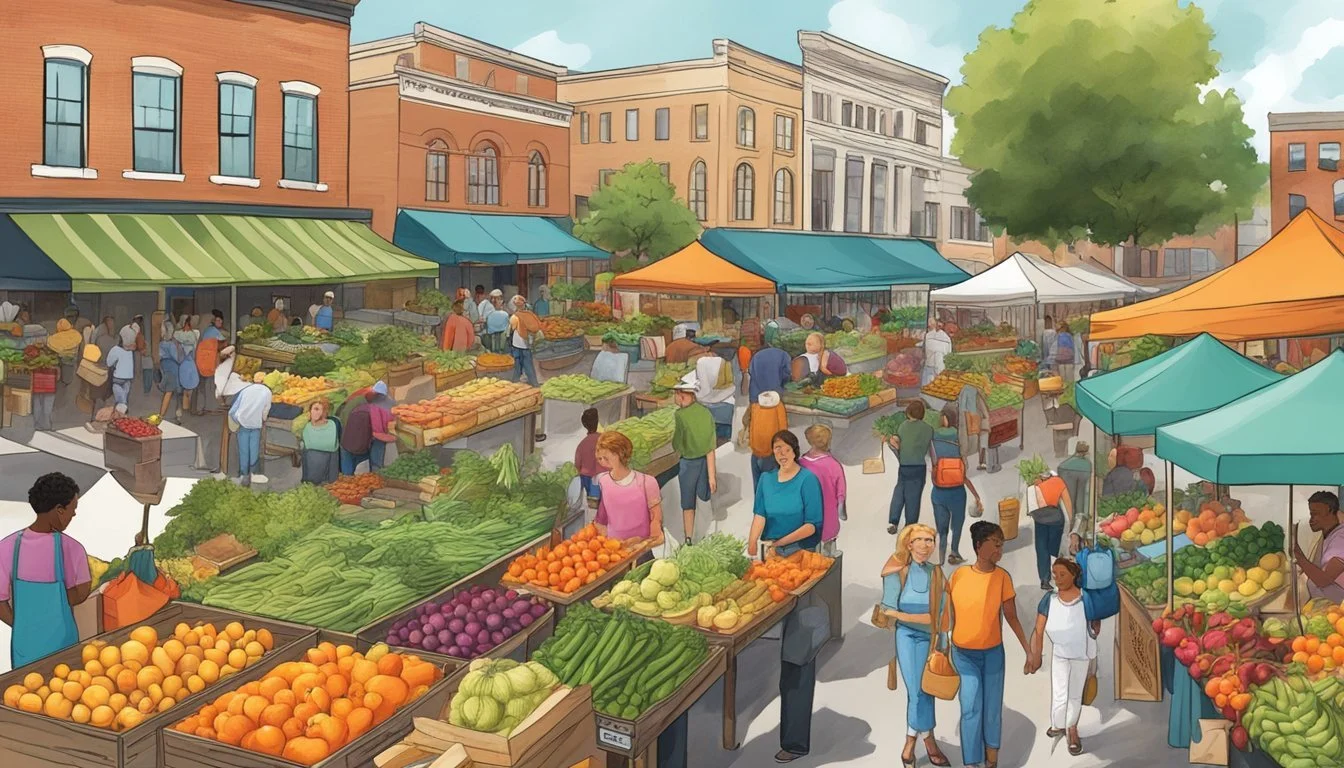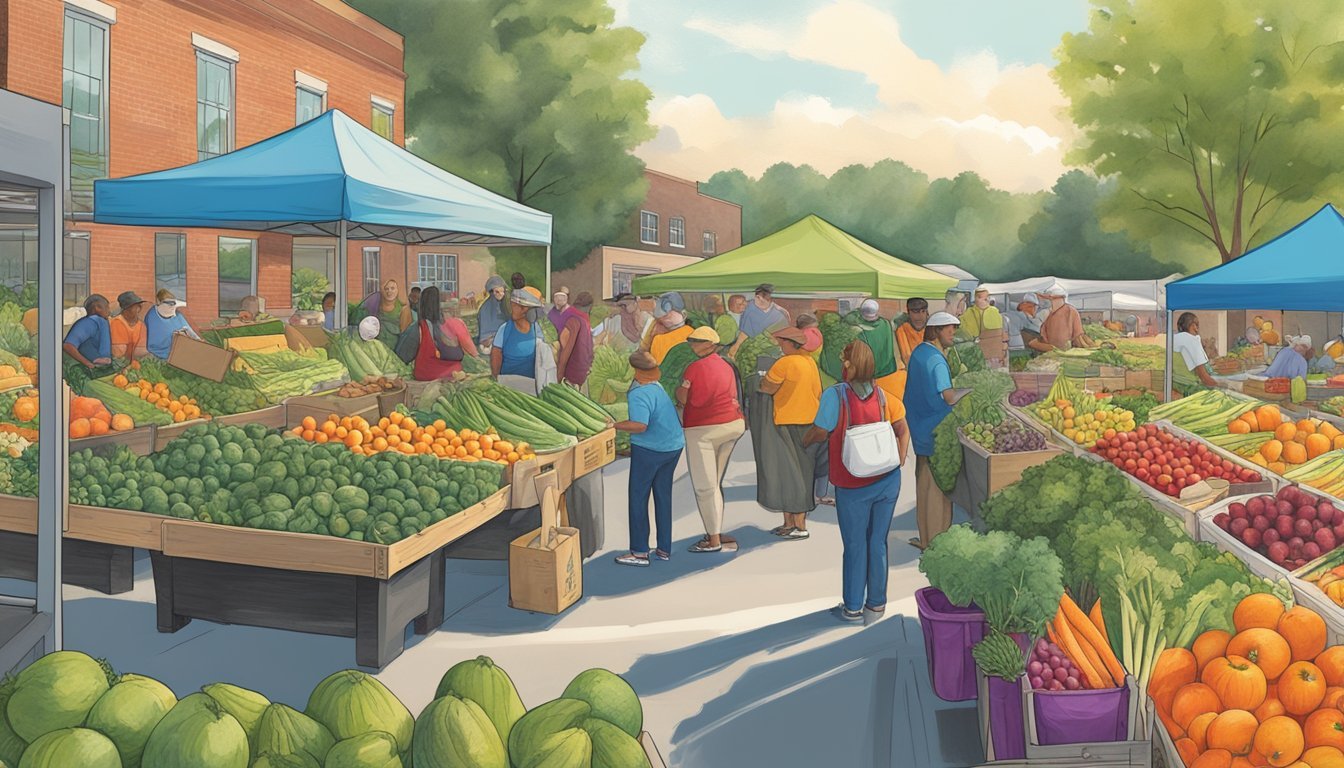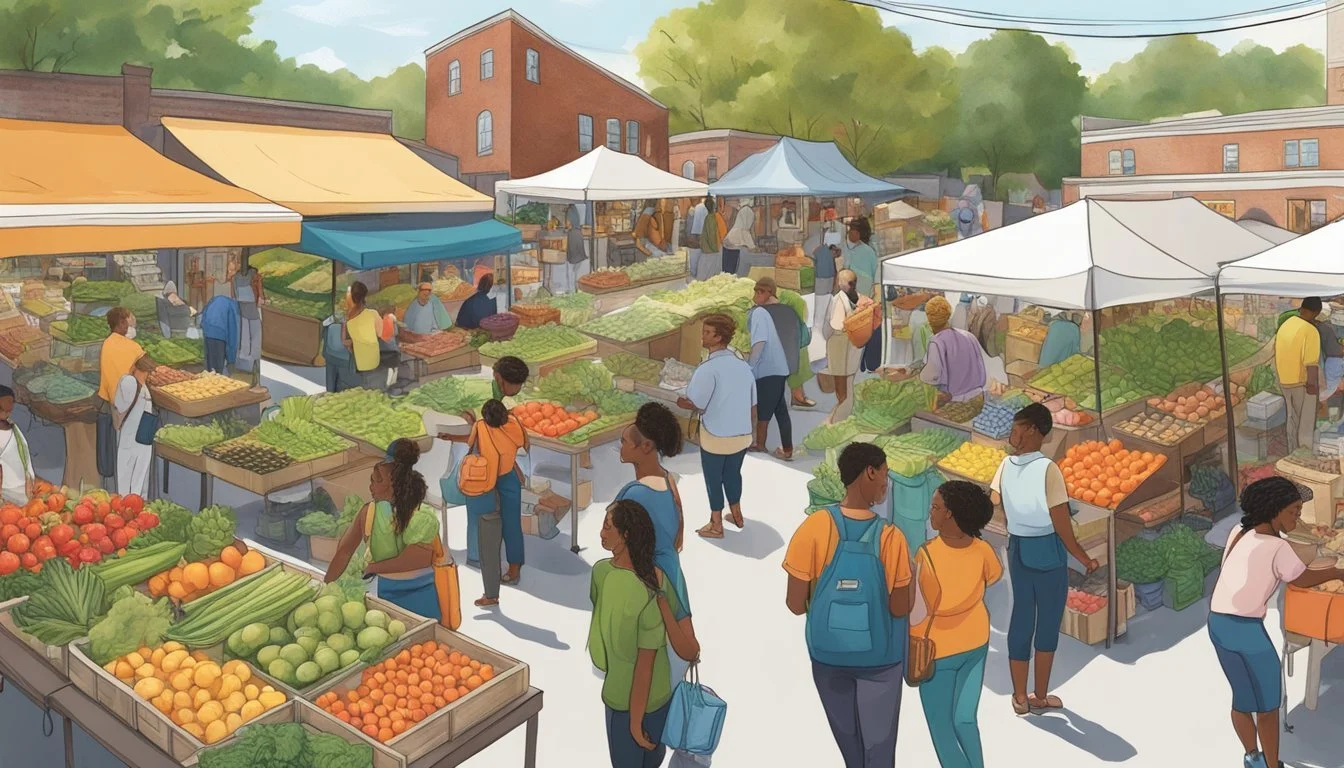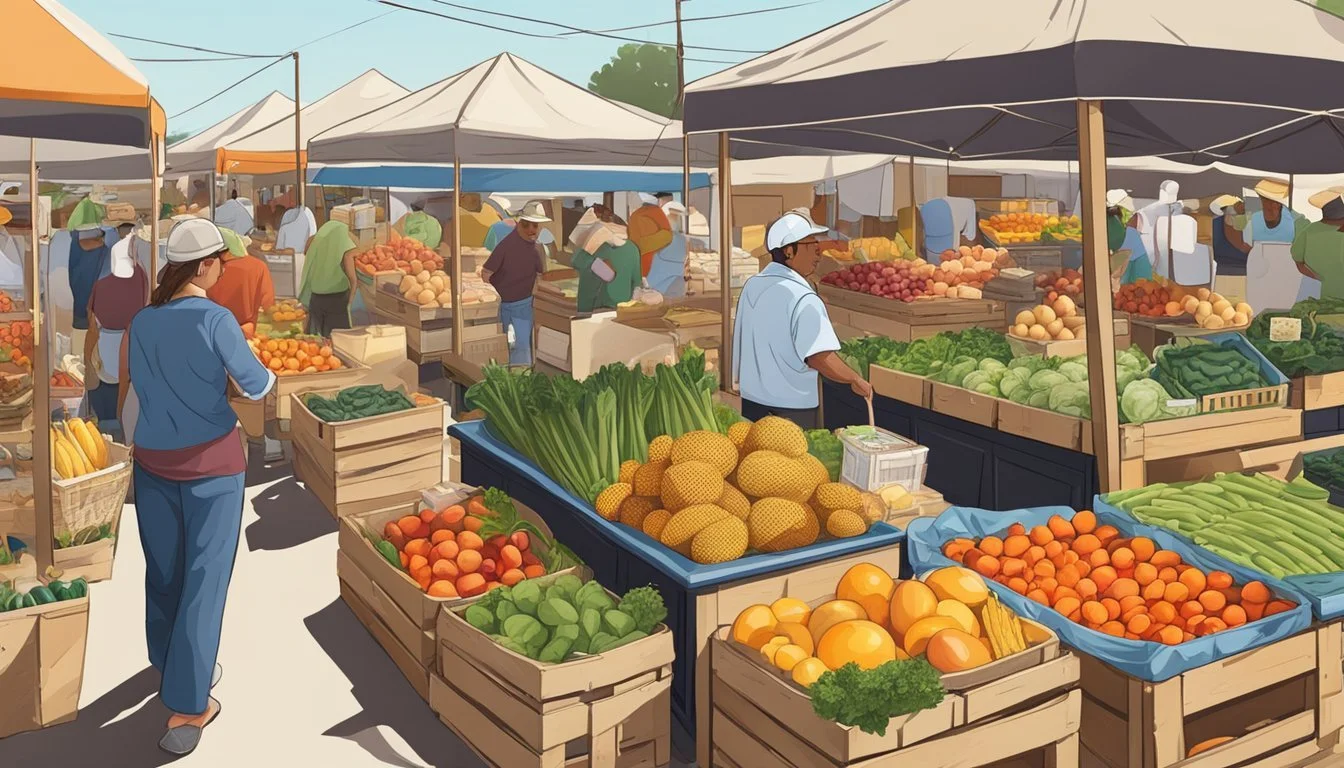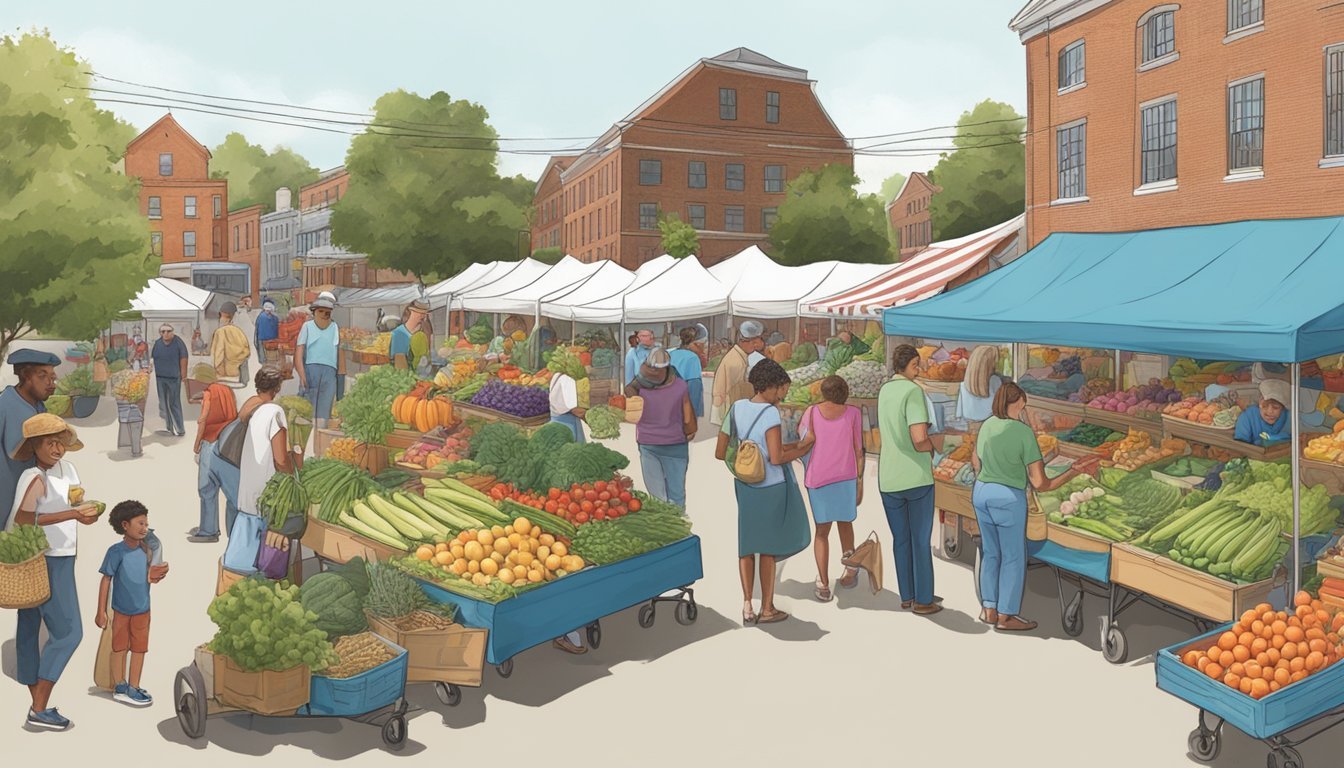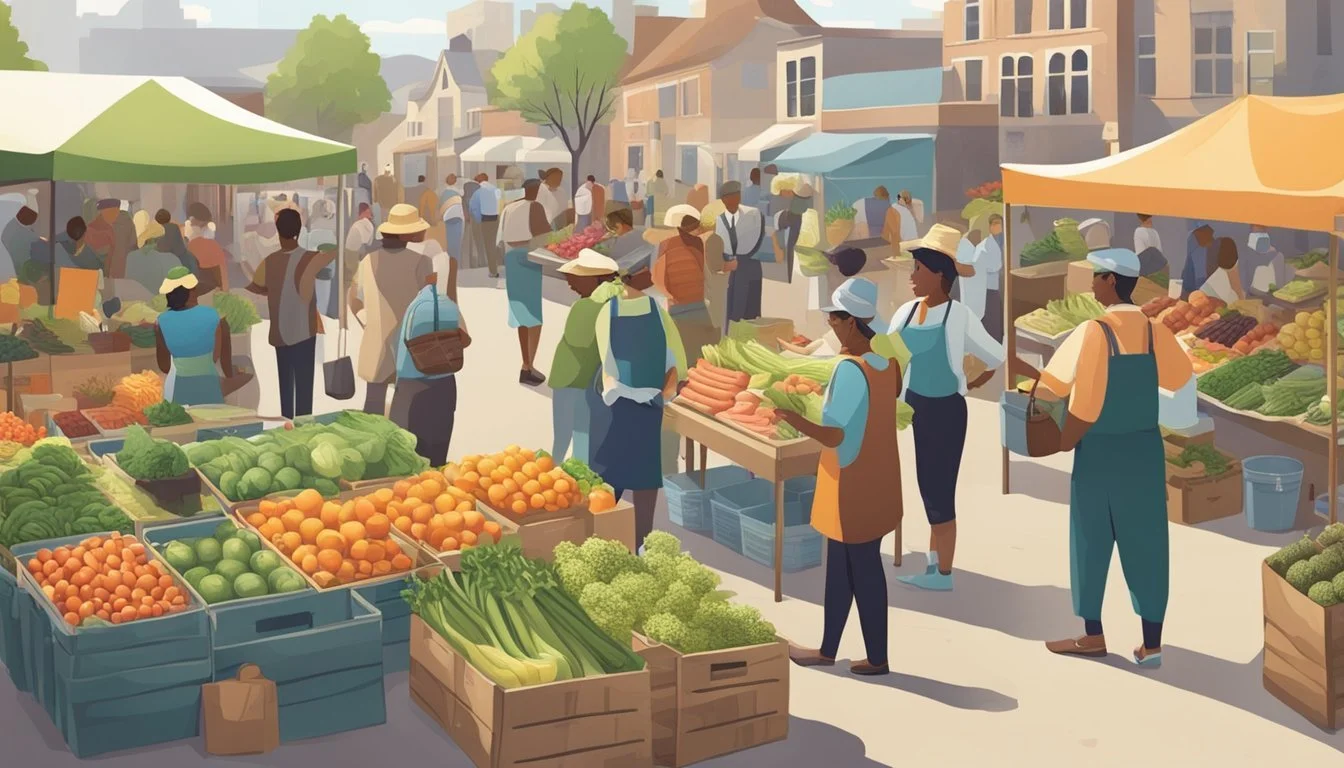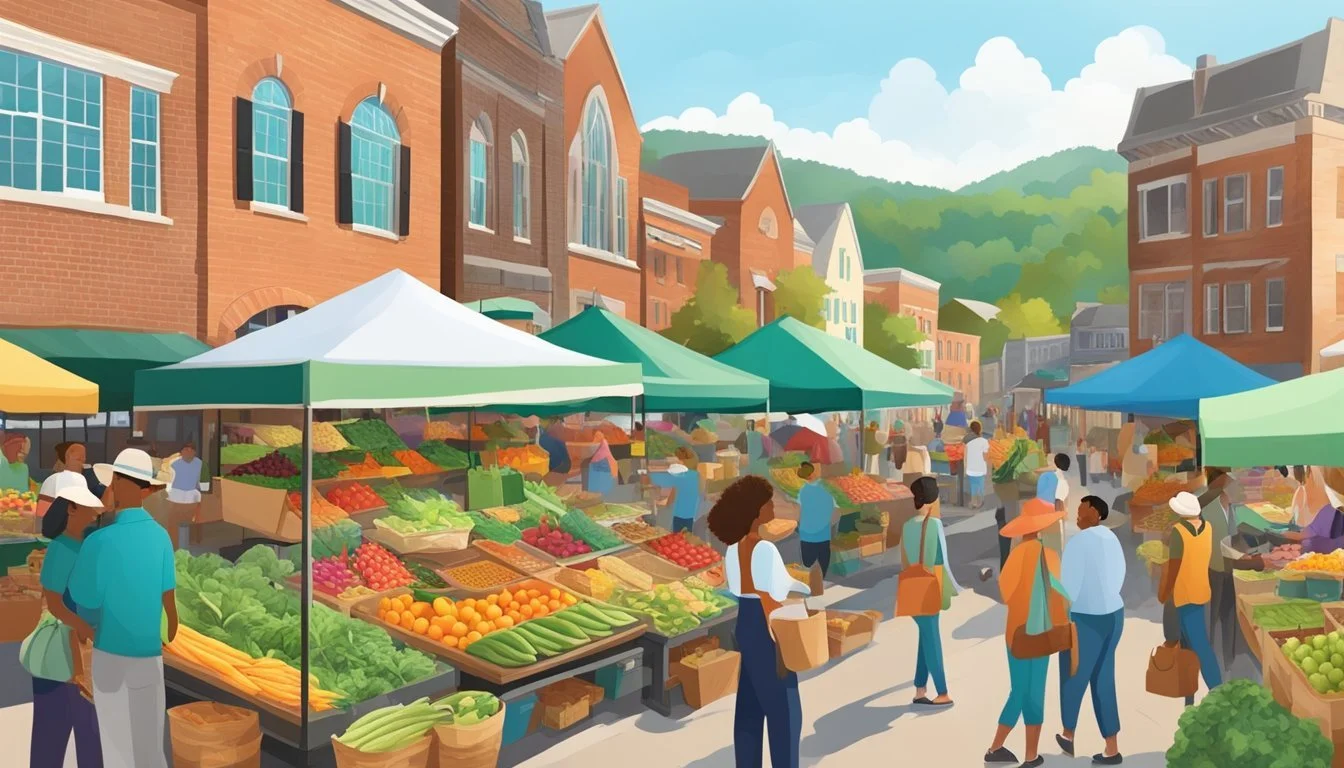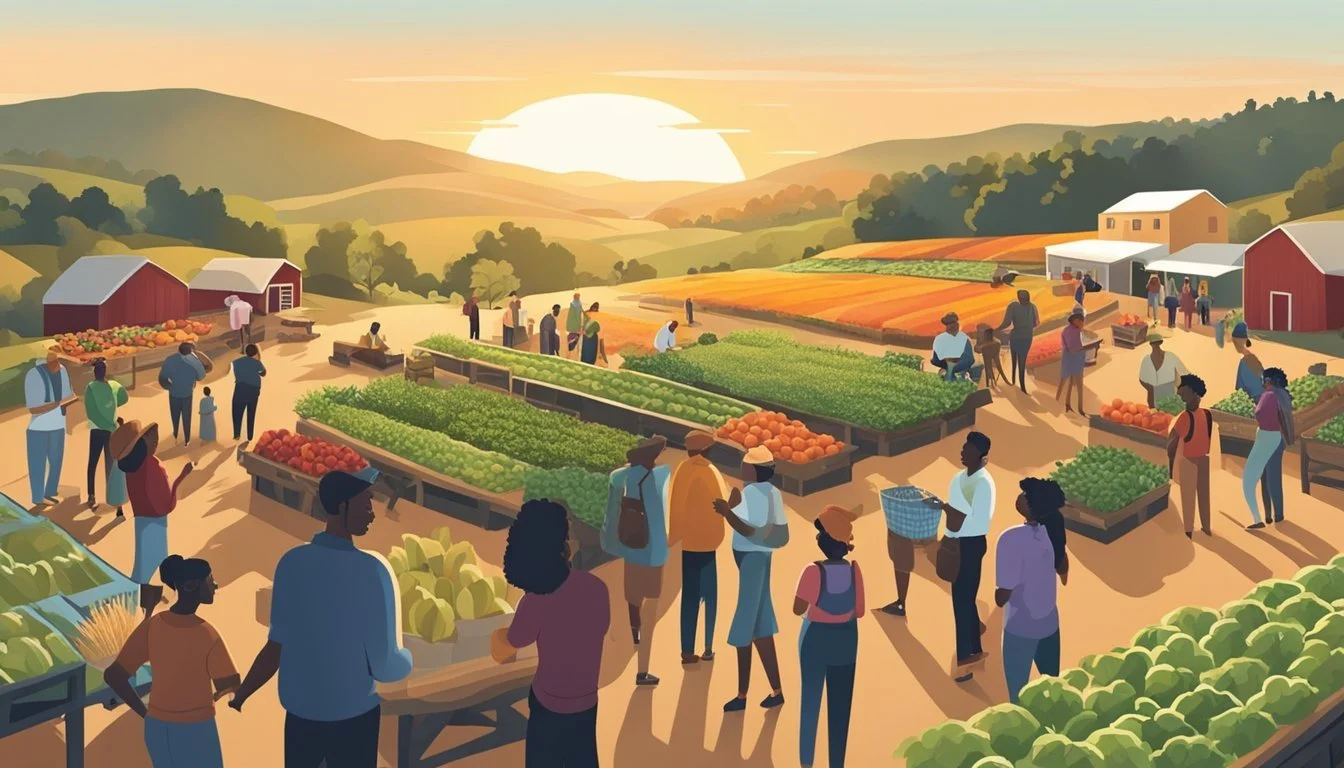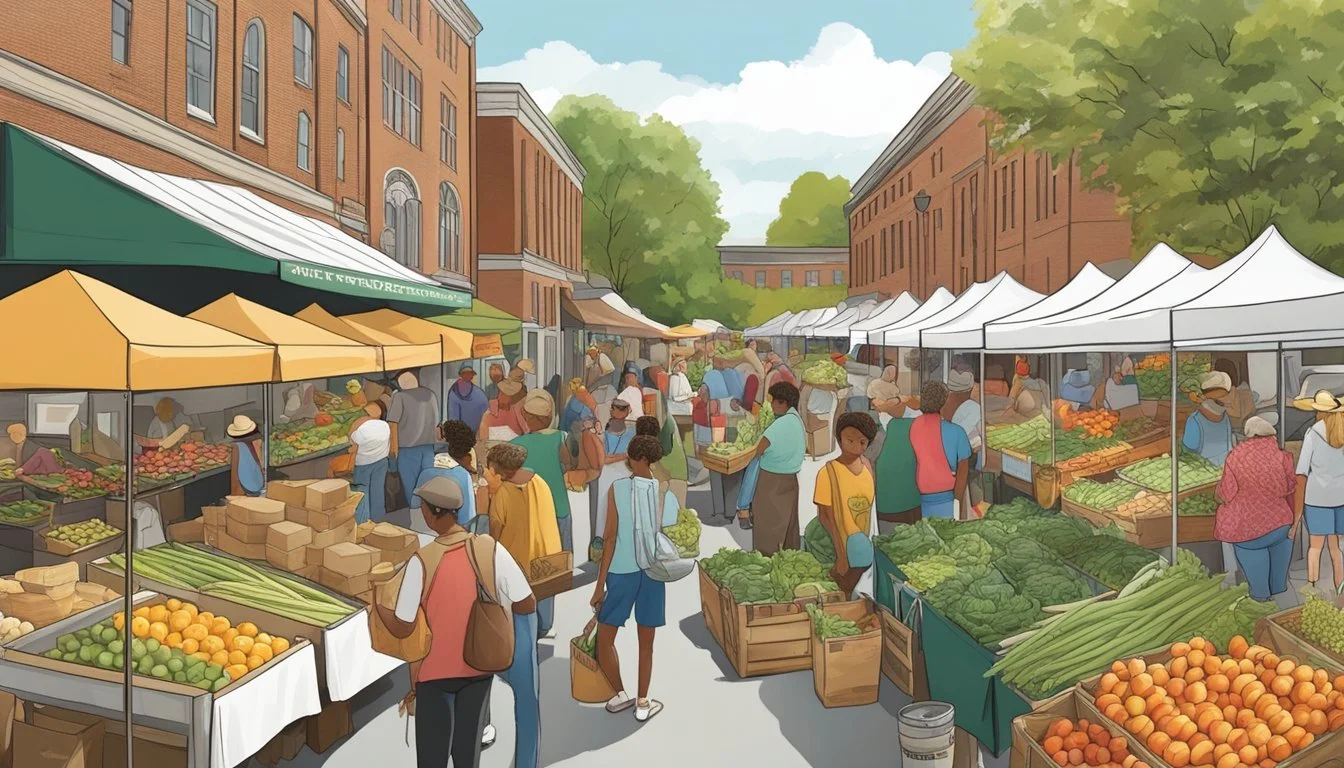Community Supported Agriculture (CSA) in Durham, NC
Your Guide to Local Produce Partnerships
Community Supported Agriculture, commonly known as CSA, is a growing movement in Durham, North Carolina that connects local farmers with consumers desiring fresh, organic, and locally-sourced products. Through CSA programs, Durham residents can subscribe to receive regular deliveries of a diverse array of farm goods ranging from fruits and vegetables to fresh flowers, eggs, meats, and cheeses. This model not only supports the local economy but also encourages sustainable agricultural practices and a deeper understanding of where food comes from.
The city of Durham hosts several CSA programs, fostering a partnership between farmers and community members. These initiatives are integral to building a local food system that not only prioritizes healthy eating but also puts a face to food producers in the area. Subscribers to a CSA enjoy the benefit of knowing their food is grown with care while farmers gain a reliable market for their produce. In embracing CSAs, Durham residents show a commitment to sustainable living and a supportive stance toward the environment and local economy.
Understanding CSA in Durham, NC
Community Supported Agriculture (CSA) is a significant aspect of Durham's local food economy, uniting producers and consumers in a network that strengthens community ties and supports sustainable farming practices.
History of CSA in the Triangle Area
The Triangle area, encompassing Raleigh, Durham, Chapel Hill, and Cary, embraced the CSA model as part of a broader movement toward local, sustainable food systems. In response to a growing demand for farm-to-table products, local farms began offering CSA shares, effectively forging a dependable revenue stream while providing residents with fresh, seasonal produce. This symbiotic relationship has helped maintain the agricultural heritage of Durham and its neighboring cities.
CSA Business Models in Durham
In Durham, various CSA business models cater to diverse consumer needs:
Producer-Initiated CSAs: These are the most common in the area, where individual farms offer shares directly to consumers.
Member-Initiated CSAs: Groups of consumers come together to support a farm, often playing a more active role in farm operations.
Multiple-Producer CSAs: Several growers coordinate to provide a broader variety of products, enhancing the selection available to CSA members.
Organization-Initiated CSAs: Local organizations or co-ops serve as facilitators between farmers and consumers to manage CSA subscriptions.
Each model is designed to optimize the balance between community involvement and agricultural productivity. Durham's CSA landscape continues to evolve, adapting to community needs and helping to establish North Carolina as a leader in innovative agricultural practices.
Benefits of Joining a CSA
Joining a Community Supported Agriculture (CSA) program in Durham, NC, offers tangible advantages, from enhancing your diet with fresh, locally grown foods to strengthening community ties and promoting sustainable farming practices.
Access to Fresh and Organic Produce
CSA members enjoy a diverse array of farm products direct from local fields. Fruits, vegetables, eggs, meats, and herbs arrive at their peak freshness, often with organic and regenerative farming methods ensuring minimal chemical use. This direct farm-to-table approach not only provides nutrient-rich, healthy food options but also supports the sustainable agriculture movement prevalent in the Durham area.
Supporting Local Farmers and Economy
By joining a CSA, members directly invest in their local farmers and the Durham economy. Local food dollars stay within the community, bolstering the financial stability of farms and contributing to a vibrant local market for food. This symbiotic relationship creates a dependable income stream for farmers, especially crucial during the early growing season.
Environmental Advantages of CSA
Embracing CSA hinges on principles of sustainable and regenerative agriculture, which work hand in hand to minimize environmental footprints. Techniques such as crop rotation, no-till farming, and the use of organic fertilizers underpin this model, fostering a healthier ecosystem. CSA members indirectly contribute to these environmental benefits, ensuring a commitment to the planet that aligns with the community's ecological values.
CSA Operations and Management
Community-supported agriculture (CSA) in Durham, NC requires strategic planning and management to ensure sustainable operations. By focusing on organizing the farm and precise budgeting methods, local farms can connect with their community and ensure a stable supply of farm products through the season.
Organizing a CSA Farm
When establishing a CSA farm, the team must develop a detailed business plan that outlines the farm's structure and operational goals. A critical step is to determine the farming practices that will be employed; many CSAs in Durham commit to sustainable farming practices, utilizing organic substrates and avoiding synthetic pesticides to maintain the natural health of their land. Recruitment of members is often conducted well in advance of the season to gauge demand and set production targets. Pick-up locations are strategically chosen to be accessible for all CSA members, often at the farm itself or a central community spot.
Key Tasks:
Develop a comprehensive business plan.
Recruit members and set clear expectations.
Select sustainable and organic farming practices.
Establish convenient pickup points for CSA shares.
Budgeting and Share Pricing
Budgeting is foundational to the success of a CSA farm. The team must account for all costs associated, including seeds, labor, equipment, and land maintenance. The share price reflects these costs and is often determined by the expected yield and the type of farm products offered. Typically, members pay for their shares before the start of the season, which helps the farm cover its initial expenses. Local farms in Durham offer a variety of share options tailored to different customer needs. The budget should also factor in market variations and potential risks to ensure financial stability throughout the year.
Budget Components:
Production costs (seeds, labor, maintenance, etc.)
Share pricing strategy.
Contingency plans for unforeseen expenses.
By considering each aspect of CSA operations and management, farms can effectively recruit members, price their shares, and manage their business in a way that supports the longevity and productivity of the CSA model.
Types of Products Offered by CSAs
Community Supported Agriculture (CSA) programs in Durham, NC, present a cornucopia of fresh, locally-sourced products. Subscribers to these CSAs receive regular deliveries of farm-fresh items, fostering a direct link between local farmers and consumers.
Variety of Agricultural Produce
CSAs in Durham, NC, typically provide a diverse array of vegetables and fruits. These can include both common and heirloom varieties, ensuring customers have access to fresh seasonal produce. Examples of such vegetables might include tomatoes, peppers, leafy greens, and root crops. Fruit offerings are similarly varied, commonly featuring berries, apples, peaches, and other orchard fruits appropriate to the growing season in North Carolina.
Organic options are often available, with some farms being certified organic, adhering to stringent farming practices to avoid the use of synthetic pesticides and fertilizers. The focus on sustainability extends to fostering biodiversity and maintaining soil health through ecologically responsible farming methods.
Specificity of CSA Products
Aside from produce, many CSAs offer specialized products to their members. Meats sourced from local farms are frequently included, with options such as chicken, beef, pork, and sometimes lamb or turkey. Eggs from free-range poultry are another staple, noted for their freshness and superior flavor compared to store-bought alternatives.
In the realm of dairy, some CSAs may offer locally produced cheeses, often crafted with milk from cows or goats raised on nearby pastures. Additionally, fresh herbs are a common sight in CSA boxes, giving customers a chance to enhance their culinary creations with organic and aromatic flavors.
Fueled by a commitment to local agriculture, CSAs in Durham contribute to the sustenance of small-scale local farmers and provide a dependable marketplace that supports the local economy. Patrons of CSAs typically enjoy these products with the knowledge that they are not only receiving high-quality fare but are also participating in a system that values environmental stewardship and the cultural benefits of local farmers' markets.
Seasonal Availability and Selection
Community Supported Agriculture in Durham, NC, thrives on seasonal produce, providing a rich variety of vegetables and fruits throughout the year. Subscribers can expect their shares to reflect the planting and harvesting guide of the region, ensuring fresh, local produce at its peak.
Planning for Seasonal Harvests
Farmers in Durham, NC, carefully plan their planting schedules to optimize the variety and abundance of crops available in CSA shares. For example:
Spring: As the last frost ends, typically by the end of April, leafy greens like spinach and kale, along with root vegetables such as radishes and carrots, find their way into CSA boxes.
Summer: The warmer months bring a bounty of tomatoes, cucumbers, and peppers, along with stone fruits like peaches and plums starting in July.
Fall: Harvests transition to squash, apples, and late-season greens, usually available through October.
By adhering to the natural growing season, CSA members receive produce that not only tastes better but also supports sustainable farming practices.
Understanding Share Contents Through the Year
The contents of CSA shares change throughout the year as different crops enter and exit their peak seasons. Subscribers can usually anticipate:
Early Season (Spring to Early Summer): A mix of tender greens, herbs, spring onions, and strawberries.
Mid-Season (Summer): Bulky vegetables such as zucchini and eggplants, alongside melons and berries.
Late Season (Fall): Hearty items like potatoes, winter squash, and apples, which are great for storage and versatile in recipes.
Durham's CSAs enable members to enjoy fresh, in-season produce and to understand the rhythms of local farming, while also supporting local agriculture.
CSA Membership and Community Engagement
Community Supported Agriculture in Durham, NC, thrives on the support of members who subscribe to shares of a farm's produce and actively participate in fostering a vibrant local community. This engagement is a partnership between local farmers and community members aiming to strengthen the local food economy and create sustainable farming practices.
Attracting and Retaining CSA Members
Farmers in Durham have developed various strategies to attract and retain members for their CSA programs. It starts with the visibility of their operations, often facilitated by a presence at the Durham Farmers Market, a popular venue for locals interested in fresh, seasonal produce. They provide clear information on the cost and contents of CSA boxes, with prices typically ranging from $400 to $700 annually. Transparency about the farming process and the variety of products, including fruits, vegetables, eggs, meats, and cheeses, helps build trust and a loyal customer base.
To retain members, CSA farms ensure constant communication, often through weekly newsletters detailing the contents of the upcoming box, news from the farm, and invitations to members for on-farm events. Local CSAs also emphasize the importance of community by offering volunteer opportunities on the farm, which foster a sense of belonging and commitment.
Building Community Through CSA Initiatives
CSA initiatives in Durham are not just about producing food but are deeply rooted in community engagement. The relationship between local farms and the community is reinforced through various activities and partnerships. For example, some farms might partner with local fitness centers to promote healthy living, highlighting the link between diet and wellness.
CSA programs often organize events that allow members to visit the farms, engage with the farming team, and learn about sustainable agriculture firsthand. Furthermore, they might encourage collaboration with local schools for educational programs that teach children about farming and local food systems. The CSA model inherently supports a symbiotic relationship where the community investments help sustain the farms, and in return, members receive fresh, locally-sourced produce, thereby reinforcing the community-supported agriculture ethos.
Partnerships and Collaborations
Community Supported Agriculture (CSA) in Durham, NC, thrives through strong local partnerships and collaborative efforts focused on enhancing community food security and supporting the local food system.
Working with Local Markets and Businesses
Local markets and businesses in Durham have established symbiotic relationships with CSAs, ensuring a steady flow of fresh and locally-sourced produce. Btown Farm, for instance, not only provides CSA boxes from April through October but also operates a produce stand every Saturday morning. This direct partnership benefits both the farm, by guaranteeing a consistent market for its products, and the community, by offering easy access to healthy food options.
Community Partners and Food Security
CSAs in Durham are deeply embedded in the fabric of the community, playing a significant role in combating food insecurity. Initiatives like the Durham County community-supported agriculture project, initiated by RAFI-USA staff, emphasize creating local partnerships to provide a guaranteed source of income for farmers and a sustainable food source for the community. These CSA programs often work in conjunction with area food banks and are instrumental in increasing the community's access to farmland, thereby bolstering food security. Notably, the Immaculate Conception Catholic Church has been associated with the CSA model, demonstrating the varied collaboration between faith-based organizations and agricultural programs. Additionally, efforts to incorporate equity frameworks into agriculture, spearheaded by the Duke Campus Farm, reveal an ongoing commitment to inclusive community development, which can include supporting refugee resettlement through agricultural opportunities.
Local CSA Farms and Products
Community Supported Agriculture (CSA) in Durham, NC, connects residents with fresh, locally-grown produce, while supporting the regional agricultural community. This section focuses on the most notable CSA farms and their unique offerings in the area.
Highlighting Notable Farms in Durham, NC
South Wind Produce sits proudly in Rougemont, offering an array of produce to its local community. Committed to sustainable farming practices, they provide a rich selection of vegetables and fruits without reliance on harmful pesticides, valuable to both the Durham and Triangle regions.
Fickle Creek Farm, based in Efland, is a trusted source of farm-raised meats within the North Carolina Piedmont. Specializing in environmentally responsible and ethically raised livestock, the farm ensures high-quality meat for CSA subscribers.
The Garden at Spring Forest and Hawkfield Manor in Person County involve themselves deeply within local farmers' markets, providing community access to fresh and nutritious food options.
Harland's Creek Farm, known for its certified organic produce, has a dedication to maintaining the agricultural heritage that thrives in North Carolina.
Unique Offerings from the Local Farms
Hilltop Farms and Double T Farm, near Raleigh and Cary respectively, are celebrated for their certified organic produce, contributing to Cary's rich agricultural heritage with their wide range of high-quality foodstuffs.
Chickadee Farms not only supplies organic produce but also focuses on certified organic flowers, introducing them to local CSA boxes.
Good Hope Farm, another embodiment of the Triangle's family-farm spirit, highlights the importance of locally-grown food in fostering community and environmental health.
Nithin's Organics offers a unique CSA experience by emphasizing organic farming practices along the Eno River, further enriching the array of choices for CSA participants.
Farms such as Double T Farm and Hilltop Farms encourage community engagement with pick-your-own opportunities, including crops like blackberries, enhancing the connection between consumers and the source of their food.
Educational Resources and Community Events
Community-Supported Agriculture (CSA) programs in Durham, NC, are more than just food subscription services—they're opportunities for education and engagement with the local food systems. These programs offer a range of educational resources and events designed to enrich the community's understanding of sustainable agriculture and provide practical knowledge for CSA members.
Workshops and Farm Visits
Durham's CSA farms frequently host workshops tailored to both adults and children. These workshops cover topics such as sustainable farming practices, the importance of local food systems, and how to cook with seasonal produce. Farm visits are also organized, offering members a chance to experience farm life first-hand. Here, they can see where their food comes from, meet the farmers, and sometimes even participate in the harvest.
Example Workshops:
Composting 101: Learn how to create nutrient-rich compost for your garden.
Seasonal Cooking Demonstrations: Discover new recipes that highlight the best of the season's harvest.
Upcoming Farm Visits:
Open Farm Day: Tour the farm, participate in activities, and meet your local growers.
Resources and Guides for CSA Members
CSA programs in Durham understand the importance of supporting their members with robust resources. Members are typically provided with a resource list at the start of their subscription, which includes:
Recommended reading materials on agricultural practices
Tips for storing and preserving fresh produce
A collection of recipes that utilize the CSA box contents to encourage cooking with less common but nutritious ingredients
Note: The provided information may be subject to change, and interested individuals should contact their local CSA providers for the most current event schedules and resource availability.
Fostering Sustainable Practices
Durham, NC's CSA initiatives are notable for their commitment to sustainable and organic farming, which stands at the forefront of the region's efforts to improve the local food system. They integrate regenerative agricultural techniques to maintain and enhance soil fertility, leading to more resilient food production.
Promoting Organic Farming
Farmers in Durham utilize sustainable farming practices to prioritize soil health. Techniques include cover cropping and crop rotations, which are pivotal in restoring organic matter and balancing soil nutrients. Certified organic and GAP-certified farms ensure that their products, from vegetables to gourmet edible mushrooms, meet stringent standards. Organically grown produce is not only chemical-free but also supports the ethos of sustainable agriculture. Farms in the region often extend subscription-based models where consumers can purchase weekly or monthly boxes containing an assortment of organic, and whenever possible, raw farm products.
Key sustainable practices include:
Cover cropping
Crop rotation
Organic matter restoration
Chemical-free farming
Subscription-based sales models
Advocacy for Food Sovereignty
In Durham, CSA programs advocate for food sovereignty where the community has control over the production and consumption of its food, creating a sustainable food system. This approach supports minority communities in both rural and urban settings, fostering access to healthy, sustainable, and locally-produced food. Through regenerative agriculture practices, these initiatives promote not just environmental stewardship but also social equity within the food economy. By doing so, they encourage communities to engage directly with the origins of their food and the people who grow it.
Advocacy efforts focus on:
Enhancing local control over food production
Supporting minority communities
Providing access to healthy, locally-produced food
Encouraging community engagement with local farmers
These practices exemplify a dedicated effort towards a robust, ecologically sound, and equitable food system in Durham, NC.
Future of CSA in Durham and Surrounding Areas
Community Supported Agriculture (CSA) in Durham, NC, stands on the threshold of growth, poised to broaden its influence in the Triangle area, including Raleigh, Chapel Hill, and Cary. This section examines the potential rise of CSA's presence and the dynamics it faces.
Expanding the Reach of CSA
CSA in the Durham area has the potential to extend significantly. Key factors influencing this expansion include:
Increased consumer interest in locally sourced, sustainable foods.
Partnerships between farmers and local businesses, potentially offering drop-off points for share collections.
Collaboration with educational institutions to foster awareness and participation in CSA programs.
The growth trend suggests an uptake in CSA memberships, as more residents of Durham and its neighboring cities recognize the value in fresh, locally produced goods. Utilizing social media and other online platforms can also play a crucial role in connecting farmers directly with a broader audience.
Challenges and Opportunities
The future of CSA in Durham is not without its hurdles; however, these challenges present unique opportunities for the community and farmers. Primary challenges include:
Logistical complexities of scaling operations without compromising product quality or ecological principles.
Balancing cost and accessibility, ensuring shares remain affordable for a diverse demographic.
In response, CSA programs may explore opportunities such as:
Adopting innovative farming practices to improve yield and sustainability.
Forging community alliances to support educational programs about the benefits of CSA, thereby cultivating a loyal and informed customer base.
By addressing these challenges directly, CSA in Durham and the surrounding Triangle area can fortify its future, ensuring its role as a cornerstone for local agriculture and community well-being.

